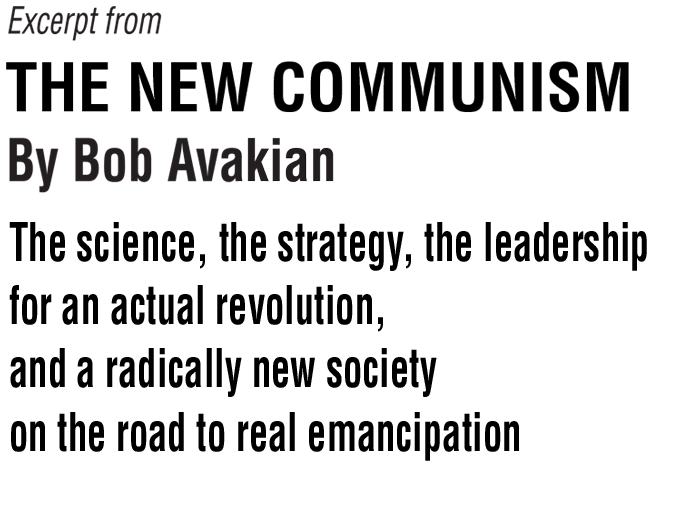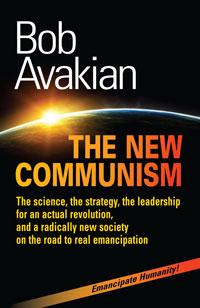
The following is an excerpt from the work by Bob Avakian, The New Communism. In addition to this and other excerpts posted on revcom.us, we will be running further excerpts from time to time on revcom.us. These excerpts should serve as encouragement and inspiration for people to get into the work as a whole, which is available as a book from Insight Press and as a PDF online at revcom.us.


This excerpt comes from the section titled "IV. The Leadership We Need."
Here we get back to a point that was made, toward the beginning of this presentation, on the base and the superstructure—the economic system, the mode of production, and how it sets the terms for things in society overall, and how, in turn, the superstructure that arises on that economic base serves to reinforce it. In other words, the political and ideological superstructure—the political system, the laws, the culture, the ideas that dominate in the society—have to be in accordance with that mode of production, or the society can’t function. So if you go down the road of saying we’re gonna use capitalist means to get a lot of wealth, if that’s the mode of production that’s operating, then you have to have a superstructure of laws, political institutions, culture and ideology, and so on, that goes along with and enforces that capitalist system, even if you once had a different set of ideas.
Think about this specifically in terms of the culture and the ideology. I talked about this earlier, the idea that the bourgeoisie always promotes—that the great thing about bourgeois society, the major change it brought about, was elevating the individual to the prime place in society, putting forward the sanctity of the individual and the importance of individual rights. I discussed how that’s a complete farce and completely in conflict with how bourgeois society actually operates—by exploiting masses of people and crushing and pulverizing literally billions of people around the world. But the idea of individualism is very much in keeping with and very much serves the bourgeois exploitative mode of production. The idea that everybody should be out for themselves is reinforced by the fact that you are in competition with everybody else—for jobs, for promotions, for scholarships, for admission to college, for whatever it might be. So that is encouraged and fostered by the mode of production, by how the economic system works and how it affects people. And then, in the superstructure, it is reinforced with the idea that the most important thing is the “self”—the “self” is the center of everything. No matter what else is going on in the world, the most important thing, the thing that you should be concerned about, above all, is yourself. That’s the only way you can go through the world. This is constantly pumped at people, and it constantly gets reinforced even when people try to break with it. It requires a tremendous struggle to get out of the framework that, when everything is said and done, “I am the most important thing in the world.” And, besides the way in which this goes along with the bourgeois notion that the striving for individual acquisition/private accumulation of wealth is the most legitimate and productive motive force in social development, it conforms to the interests of the ruling class because, if you have a society where everyone is thinking that way, you’re never going to be able to bring about any kind of significant social transformation. You’re going to remain stuck within a system where people are being exploited and oppressed, but everybody is out for themselves in competition with everybody else.
Now, imagine if you had a radically different superstructure—if you had art and culture, widely and consistently disseminated over the TV, the internet, and so on, promoting the idea that people should think first and foremost about the greater good of the people in the world as a whole, instead of themselves. That would definitely undermine the way this system works. Or take another example of how the superstructure has to relate to the base. If you look at ads on TV or watch the news on TV, they’re always promoting these entrepreneurs, people who start up little businesses; there are ads for getting business cards so you can more effectively advertise your business; and “Oh, I have this little clever idea about making muffins, so I started a business”; and on and on and on. Now imagine if, instead of that, they continually told people the truth: “It’s not that often that a small business becomes a big money-making enterprise; a high percentage of small businesses fail, sooner or later, and many of them fail quickly; so forget it, don’t get all caught up in the mythology of business entrepreneurship.” Imagine if, every time you turned on the TV, you heard that kind of message! Well, that would not serve the functioning of this system. They want people to think that everybody can succeed in business, if they try hard and have the right initiative. In reality, of course, only a small number of people can actually be big-time capitalists, but it’s very good for the big capitalists, and for the system overall, if everybody thinks they might have a chance to do it. So, if you had a whole set of ideas being promoted that were actually telling people the truth about this, it would completely undermine that.
Or what if program after program on television, and everything you saw through the internet, were telling people: “Look, let’s be honest with ourselves. The reason this country is so wealthy and powerful is not because there have been a bunch of people who innovated a lot of things. It’s because we brought millions of people from Africa in chains and drove them viciously to produce wealth, while we killed off large sections of the indigenous population and stole their land; through a war of aggression we seized half of Mexico’s territory and extended the slave system into large parts of that territory; we grabbed up places like the Philippines and Puerto Rico as colonies as we moved to dominate more and more of the world; and now we’re plundering throughout the world, especially the Third World, ruthlessly shackling large swaths of humanity to our juggernaut of exploitation, threatening and unleashing massive slaughter and destruction to enforce all this. That’s really why we’re so wealthy and powerful.” Well, you’d get some assholes who’d say, “OK, good, as long as I get mine.” But a lot of people would say, “Wait a minute—that’s how all this has come about? What’s going on here? I don’t want to live in a world where that’s what we’re doing.” So you can’t have ideas dominating in the superstructure, in the culture, in the media and so on, that are completely out of keeping with the functioning of the underlying economic system and the interests and needs of the ruling class of that system—which is, in a real sense, as Marx put it, the personification of the exploitative dynamics of that system.
This is what has happened with the restoration of capitalism in China, and with what the ruling elites in countries like Angola are doing. If you’re going to go down the capitalist road and use the capitalist mode of production as the basis economically for your society and your means of accumulating wealth, then you’ve got to promote the ideas that go along with that—such as the idea that if a few of us make a lot of money, then we can do something good for the masses of people, even as we’re brutally exploiting and oppressing the masses of people and collaborating with capitalist exploiters in other countries. (And these days China is playing a big role in plundering Africa and exploiting the people there.) So you see that what your economic system is, is going to set the terms for what kind of political structure, but also what kind of ideas, gets instituted and promoted to reinforce that economic system.
Only with a vanguard that has a scientific approach and understands that you have to transform the mode of production, fundamentally, and, along with it, all the other aspects of those “4 Alls,” could you correctly deal with this howling contradiction, of tremendous natural wealth in these countries on the one hand and, on the other hand, the terrible situation for the people, where, even while a small handful become incredibly rich and certain other strata are elevated to privileged middle class positions, the masses of people are chained in poverty and misery. It goes back to this basic point: There is all this tremendous wealth, but if you have a mode of production that relies upon capitalist accumulation—in this case, local capitalists in league with the international capital of the imperialist system—there’s no way that the tremendous natural wealth is going to be utilized for the benefit of the masses of people, and above all their need to be freed from exploitation and the poverty and misery that flows from that.
Contents
Publisher's Note
Introduction and Orientation
Foolish Victims of Deceit, and Self-Deceit
Part I. Method and Approach, Communism as a Science
Materialism vs. Idealism
Dialectical Materialism
Through Which Mode of Production
The Basic Contradictions and Dynamics of Capitalism
The New Synthesis of Communism
The Basis for Revolution
Epistemology and Morality, Objective Truth and Relativist Nonsense
Self and a “Consumerist” Approach to Ideas
What Is Your Life Going to Be About?—Raising People’s SightsPart II. Socialism and the Advance to Communism:
A Radically Different Way the World Could Be, A Road to Real EmancipationThe “4 Alls”
Beyond the Narrow Horizon of Bourgeois Right
Socialism as an Economic System and a Political System—And a Transition to Communism
Internationalism
Abundance, Revolution, and the Advance to Communism—A Dialectical Materialist Understanding
The Importance of the “Parachute Point”—Even Now, and Even More With An Actual Revolution
The Constitution for the New Socialist Republic in North America—
Solid Core with a Lot of Elasticity on the Basis of the Solid Core
Emancipators of HumanityPart III. The Strategic Approach to An Actual Revolution
One Overall Strategic Approach
Hastening While Awaiting
Forces For Revolution
Separation of the Communist Movement from the Labor Movement, Driving Forces for Revolution
National Liberation and Proletarian Revolution
The Strategic Importance of the Struggle for the Emancipation of Women
The United Front under the Leadership of the Proletariat
Youth, Students and the Intelligentsia
Struggling Against Petit Bourgeois Modes of Thinking, While Maintaining the Correct Strategic Orientation
The “Two Maximizings”
The “5 Stops”
The Two Mainstays
Returning to "On the Possibility of Revolution"
Internationalism—Revolutionary Defeatism
Internationalism and an International Dimension
Internationalism—Bringing Forward Another Way
Popularizing the Strategy
Fundamental OrientationPart IV. The Leadership We Need
The Decisive Role of Leadership
A Leading Core of Intellectuals—and the Contradictions Bound Up with This
Another Kind of “Pyramid”
The Cultural Revolution Within the RCP
The Need for Communists to Be Communists
A Fundamentally Antagonistic Relation—and the Crucial Implications of That
Strengthening the Party—Qualitatively as well as Quantitatively
Forms of Revolutionary Organization, and the “Ohio”
Statesmen, and Strategic Commanders
Methods of Leadership, the Science and the “Art” of Leadership
Working Back from “On the Possibility”—
Another Application of “Solid Core with a Lot of Elasticity on the Basis of the Solid Core”Appendix 1:
The New Synthesis of Communism:
Fundamental Orientation, Method and Approach,
and Core Elements—An Outline
by Bob AvakianAppendix 2:
Framework and Guidelines for Study and DiscussionNotes
Selected List of Works Cited
About the Author